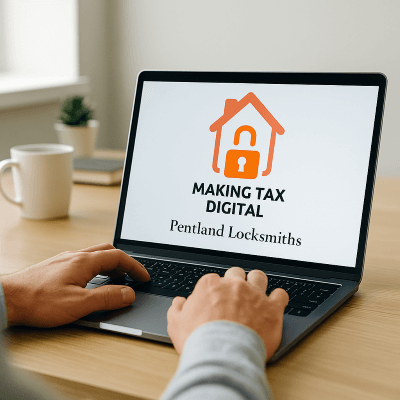What Exactly is Making Tax Digital?
For many sole traders, the world of tax can feel like a complex puzzle. And for traditional trades like locksmithing, the thought of “Making Tax Digital” often evokes more confusion than clarity. Here at Pentland Locksmith Services, like many independent locksmiths across the UK, we’re looking at the upcoming changes of MTD for Income Tax Self Assessment (ITSA) and wondering: will this new system be a help or a hindrance?
The short answer, for many of us, is likely to be: a significant new burden, at least initially.
At its core, MTD for ITSA is HMRC’s initiative to modernise the tax system. Instead of simply submitting one annual Self-Assessment tax return, sole traders (and landlords) will soon be required to:
- Keep Digital Records: All income and expenses must be recorded using MTD-compatible software.
- Submit Quarterly Updates: Four times a year, we’ll need to send summaries of our income and expenses to HMRC directly from our software.
- Make a Final Declaration: An annual declaration will still be required to finalise the tax year.
The mandatory start dates are phased in, beginning with those earning over £50,000 from April 2026, then those over £30,000 from April 2027, and so on.
Navigating the New Landscape of Making Tax Digital
Like many small, established businesses, Pentland Locksmith Services has built its operations on efficiency and direct customer service. Our focus is on fixing locks, securing homes, and getting people out of tricky situations – not spending hours wrestling with complex digital tax systems.
Currently, our record-keeping might involve a mix of paper invoices, bank statements, and perhaps a basic spreadsheet. It’s a system we understand, it’s cost-effective, and it works. But under MTD, this will no longer be sufficient.
Here’s how MTD will likely impact us:
- The Software Switch: We’ll need to research, choose, and invest in MTD-compatible software. This isn’t just a cost; it’s a learning curve. We’ll need to understand how to input transactions correctly, categorise expenses, and link it all to HMRC.
- More Frequent Admin: Moving from one annual tax submission to four quarterly updates plus a final declaration means a significant increase in administrative tasks throughout the year. While software can automate some processes, the initial data entry and verification will still demand our time. Time that could be spent on calls, repairs, or reaching new customers.
- Potential for Increased Costs: Beyond software subscriptions, there’s the possibility of increased accountancy fees if we need more intensive support to navigate the quarterly submissions. For a small business, every additional cost eats into profits.
- The Digital Divide: While we’re comfortable with digital tools for communication and scheduling, tax-specific software is a different beast. There’s a real concern about the time needed to become proficient, especially for older locksmiths who might be less digitally confident.
Is this a burden for other Locksmiths too? Absolutely!
The challenges faced by Pentland Locksmiths Services are not unique. This will resonate deeply with countless sole trader locksmiths across Edinburgh, Midlothian, and East Lothian.
- Independent Nature: Many locksmiths are truly independent, operating as one-person shows. They don’t have an admin team to handle bookkeeping. Every minute spent on tax admin is a minute away from earning money.
- Traditional Business Model: Locksmithing is a hands-on trade. The primary focus is on practical skills and on-site work. The shift to constant digital record-keeping represents a fundamental change in how these businesses have traditionally operated.
- Awareness Gap: Worryingly, many locksmiths are likely still unaware of MTD or its imminent impact. The general conversation around MTD often focuses on larger businesses, leaving sole traders feeling overlooked.
- Cost vs. Benefit: For those earning just above the MTD threshold, the immediate costs (software, potential accountancy fees, time spent) may seem to outweigh the perceived benefits of digitisation.
The Hope for the Future (and the Immediate Challenges)
HMRC argues that MTD will ultimately reduce errors, provide a clearer picture of finances, and streamline tax. And perhaps, in the long term, once the initial hurdles are overcome, this will prove true.
However, the reality for sole traders like us is that the transition period will be tough. It requires a significant investment of time, money, and effort to adapt. The initial impact will undoubtedly feel like a burden, a complex lock that many of us will struggle to pick without clear guidance and accessible support.
For Pentland Locksmiths Services, and for every independent locksmith out there, the message is clear: don’t wait until the last minute. Start understanding MTD now, explore your software options, and consider how you’ll manage your records digitally. The future of tax is digital, and while it might feel like an uphill climb, getting prepared sooner rather than later will be key to unlocking success.



